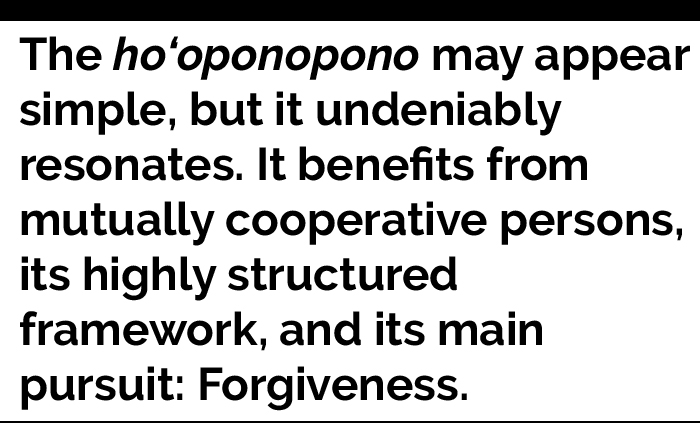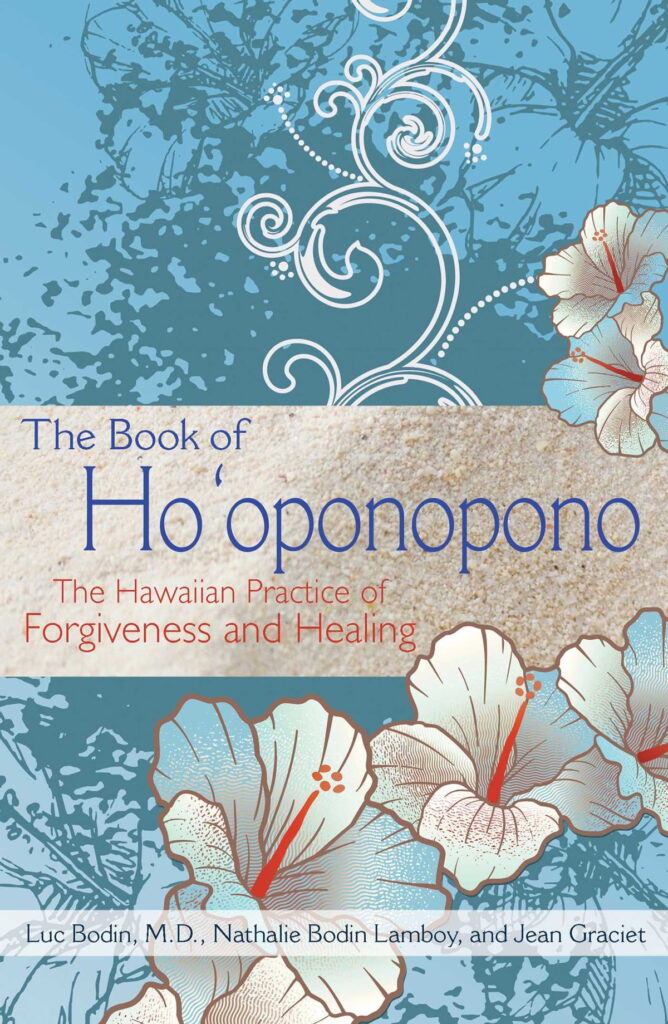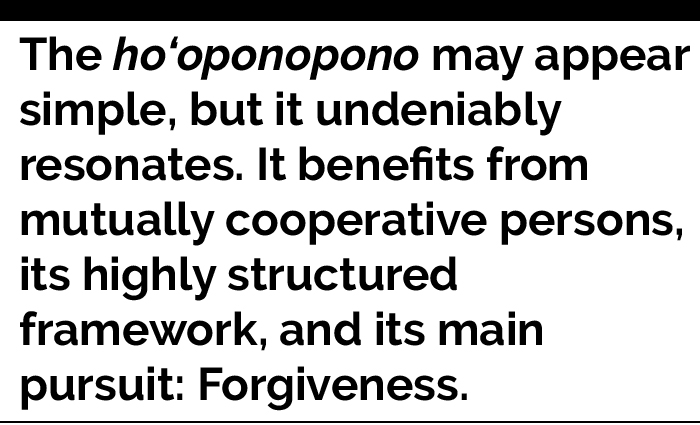Imagine stepping into a world where forgiveness, healing, and reconciliation are at the core of your being. A world where the ancient Hawaiian practice of Ho’oponopono guides you towards personal transformation and harmony with those around you. But amidst the profound healing powers that Ho’oponopono offers, a question begs to be answered: What are the ethics involved in practicing this transformative art? In this article, we explore the ethical considerations that accompany the practice of Ho’oponopono, shedding light on the responsibilities and intentions that underlie this profoundly impactful practice.
Introduction
When it comes to practicing Ho’oponopono, a traditional Hawaiian healing technique, it is important to consider the ethical aspects that underpin this practice. Ho’oponopono is more than just a meditation method; it is a philosophy that focuses on self-forgiveness, reconciliation, and restoring harmony within relationships. In this article, we will delve into the origins and principles of Ho’oponopono, understand the key concepts and beliefs associated with it, and explore the ethical considerations that are crucial to its practice.
Understanding Ho’oponopono
Origins and Principles of Ho’oponopono
Ho’oponopono traces its roots back to ancient Hawaiian traditions. Originating as a familial conflict resolution process, Ho’oponopono was used to address disputes within the community and restore balance. The principles of Ho’oponopono emphasize the interconnectedness of all beings and the importance of taking personal responsibility for one’s actions and their impact on others. It teaches that healing begins with self-forgiveness and extending that forgiveness to others.
Key Concepts and Beliefs in Ho’oponopono
In Ho’oponopono, several key concepts and beliefs shape its practice. The first is the belief that everything is interconnected. It recognizes that individuals are not separate entities but are part of a larger whole, and their actions and thoughts can affect others. Another central concept is the understanding that every person contributes to the collective experience, and by healing oneself, one can, in turn, contribute positively to their relationships and surroundings.
Ho’oponopono also places great importance on the power of forgiveness. It teaches that harboring resentment and holding onto past grievances can hinder personal growth and prevent healing. By embracing forgiveness, individuals can release negative emotions and find inner peace.
Ethical Considerations in Ho’oponopono Practice
Cultural Appropriation
One vital ethical consideration in practicing Ho’oponopono is the avoidance of cultural appropriation. As Ho’oponopono originated from the Hawaiian culture, it is essential to approach the practice with respect and understanding. Cultural appreciation involves recognizing the origins of the technique and honoring its indigenous roots. It is crucial to refrain from appropriating or commercializing Ho’oponopono for personal gain and instead employ it as it was intended – as a means of personal and communal healing.
Informed Consent
In any Ho’oponopono practice, obtaining informed consent from all parties involved is essential. The process can involve deeply personal and sensitive issues, and individuals must be fully aware of what they are consenting to. Consent should be obtained freely, without any form of coercion or manipulation, and parties should be given ample opportunity to ask questions, seek clarification, and understand the implications of the practice.
Privacy and Confidentiality
Respecting privacy and confidentiality is another vital ethical consideration. Ho’oponopono often involves sharing personal stories and experiences, and it is essential to create a safe and confidential space for individuals to open up. Practitioners must handle this information with care, ensuring that it is not shared without explicit consent and that it is securely stored and protected.
Non-Judgment
Ho’oponopono promotes a non-judgmental approach to healing. It is crucial to create an environment that fosters understanding, empathy, and active listening. Practitioners should avoid blame or criticism and instead embrace a compassionate and non-judgmental stance. By doing so, individuals can feel supported and encouraged to share their experiences and emotions freely.
Responsibility
Taking personal responsibility for one’s actions and their consequences is at the core of Ho’oponopono ethics. The practice emphasizes the importance of recognizing how individual choices and behaviors impact others. Practitioners should encourage individuals to acknowledge their role in conflicts or disagreements and promote a commitment to personal growth, improvement, and reconciliation.
Autonomy and Agency
Respecting individual autonomy and agency is crucial in Ho’oponopono practice. Each person should have the freedom to make decisions about their involvement in the process and exercise their self-determination. Practitioners must ensure that no coercion or manipulation is employed, and individuals are empowered to participate voluntarily.
Sincerity and Intent
Sincerity and genuine intent are fundamental in Ho’oponopono practice. Practitioners should approach the process with a true desire to heal and restore harmony. It is important to avoid using the technique for personal gain or with misguided intentions. Practitioners should actively cultivate a mindset of empathy, compassion, and authenticity.
Boundaries and Relationships
Maintaining appropriate boundaries in Ho’oponopono practice is crucial. Practitioners must establish clear boundaries, both personally and professionally, to ensure the safety and well-being of all parties involved. Clear communication and consent are essential in developing and maintaining healthy relationships within the practice.
Equality and Power Dynamics
Ho’oponopono practice should strive to create a space where all individuals are treated equally and with respect. Practitioners must be aware of and address any power dynamics that may exist, ensuring that each person’s voice is heard and valued. It is important to create an inclusive environment where diverse perspectives are welcomed and respected.
Accountability
Accountability is a vital ethical consideration in Ho’oponopono practice. Practitioners should take responsibility for the outcomes of the practice and be open to feedback and criticism. Continuous learning and growth should be prioritized, and commitments and obligations made to individuals involved in the process should be honored.
Cultural Appropriation
Appreciation vs. Appropriation
When engaging with the practice of Ho’oponopono, it is essential to distinguish between appreciation and appropriation. Cultural appreciation involves respectfully acknowledging and honoring the origins of the practice, recognizing its value, and learning from it. On the other hand, cultural appropriation occurs when elements of a culture are taken without proper understanding, consent, or respect for its significance.
Understanding the Cultural Context
To practice Ho’oponopono ethically, it is important to understand the cultural context from which it emerged. The Hawaiian culture holds a rich history and spirituality, and Ho’oponopono is deeply intertwined with these aspects. Educating oneself about the culture, traditions, and values of Hawaii is crucial in approaching the practice with sensitivity and respect.
Respecting Indigenous Knowledge and Practices
Ho’oponopono should always be approached with a deep respect for indigenous knowledge and practices. The techniques and teachings associated with Ho’oponopono have been passed down through generations in Hawaiian culture. It is important to honor and acknowledge this cultural heritage by ensuring that the practice is not diluted, commercialized, or exploited.

Informed Consent
Obtaining Consent from All Parties Involved
When engaging in Ho’oponopono, practitioners must obtain informed consent from all parties involved. This includes not only the individual seeking healing but also any other individuals affected by the situation or conflict. Consent should be sought in an open and transparent manner, allowing individuals to make an informed decision about their participation in the practice.
Ensuring Understanding of the Process and its Implications
Before participating in Ho’oponopono, it is crucial for individuals to have a clear understanding of the process and its implications. They should be informed about the goals, methods, and potential outcomes of the practice. Practitioners must provide comprehensive explanations and answer any questions to ensure that individuals are fully aware of what they are consenting to.
Respecting the Right to Refuse or Withdraw Consent
Throughout the Ho’oponopono process, individuals have the right to refuse or withdraw consent at any time. Practitioners must respect this right and create an environment where individuals feel empowered to make decisions in alignment with their own needs and desires. Coercion or manipulation should never be used to pressure individuals into participating against their will.
Privacy and Confidentiality
Respecting Confidentiality of Shared Information
Ho’oponopono can involve individuals sharing deeply personal and sensitive information. Practitioners must respect the privacy and confidentiality of this shared information. It is essential to create a safe and confidential space where individuals can freely express themselves without fear of judgment or violation of their privacy.
Protecting Personal Privacy
In addition to respecting the privacy of shared information, practitioners must also take steps to protect the personal privacy of individuals involved. This includes safeguarding any personal data collected during the practice and ensuring that it is securely stored and handled in accordance with applicable privacy laws and regulations.
Ensuring Secure Storage and Handling of Data
When engaging in Ho’oponopono practice, it is important to have proper protocols in place for the secure storage and handling of data. This includes using secure electronic systems or physical methods to store any information collected during the practice. Practitioners should also establish procedures for securely disposing of any data that is no longer needed.

Non-Judgment
Embracing Non-Judgmental Approach
Ho’oponopono emphasizes the importance of embracing a non-judgmental approach to healing. Practitioners should create an environment where individuals feel safe to express themselves without fear of judgment or criticism. By adopting a non-judgmental stance, practitioners can foster trust and encourage open and honest communication.
Avoiding Blame and Criticism
In the practice of Ho’oponopono, blame and criticism have no place. Practitioners should actively avoid blaming individuals for past actions or engaging in criticism. Instead, the focus should be on understanding and empathy, helping individuals move towards healing and reconciliation.
Promoting Understanding and Empathy
An integral part of Ho’oponopono is promoting understanding and empathy. Practitioners should actively foster an environment where individuals can develop a deeper understanding of one another’s perspectives and experiences. Through empathy, individuals can find common ground and work towards resolution and restoration of relationships.
Responsibility
Taking Responsibility for One’s Actions
Ho’oponopono emphasizes the importance of taking responsibility for one’s actions. Practitioners should encourage individuals to reflect on their own role in conflicts or disagreements and acknowledge their responsibility. By accepting accountability, individuals can begin the healing process and work towards positive change.
Recognizing the Impact of One’s Choices
In the practice of Ho’oponopono, individuals are encouraged to recognize the impact of their choices on others. Practitioners should facilitate discussions and reflections that help individuals understand the consequences of their actions and how they may have contributed to the current situation. This recognition is a crucial step towards personal growth and healing.
Committing to Personal Growth and Improvement
Ho’oponopono is not solely about resolving conflicts; it is also about personal growth and improvement. Practitioners should encourage individuals to commit to their own growth and development. This may involve engaging in self-reflection, learning new coping strategies, and making changes to their thoughts and behaviors that contribute to conflicts.
Autonomy and Agency
Respecting Individual Autonomy
Respecting individual autonomy is a core ethical consideration in Ho’oponopono practice. Practitioners must ensure that individuals have the freedom to make decisions about their involvement in the practice and that their autonomy is respected throughout the process. This includes the right to participate, refuse, or withdraw consent at any time.
Promoting Self-Determination
Ho’oponopono encourages individuals to take an active role in their healing and reconciliation. Practitioners should promote self-determination by empowering individuals to make choices that align with their own values and desires. By supporting self-determination, practitioners can foster a sense of ownership and agency in the healing process.
Avoiding Coercion or Manipulation
Coercion or manipulation has no place in Ho’oponopono practice. Practitioners must avoid using any tactics that may pressure individuals into participating against their will. Individuals should always feel empowered to make decisions based on their own needs and desires, free from external influences.
Accountability
Taking Responsibility for the Outcomes of Ho’oponopono Practice
Accountability is a crucial ethical consideration in Ho’oponopono practice. Practitioners should take responsibility for the outcomes of the practice, including the impact on individuals and relationships. This includes being open to feedback and continuously learning, adapting and improving the practice based on the experiences and insights gained.
Openness to Feedback and Continuous Learning
Practitioners should cultivate an openness to feedback and a commitment to continuous learning in their Ho’oponopono practice. This involves actively seeking input from individuals involved in the process and being willing to adjust one’s approach based on their needs and experiences. By embracing feedback, practitioners can evolve and refine their skills, ultimately benefiting those they serve.
Honoring Commitments and Obligations
In Ho’oponopono practice, it is essential to honor commitments and obligations made to individuals engaged in the process. This includes following through on any promises or agreements made, ensuring individuals feel supported and valued. Practitioners should strive to create an environment of trust, reliability, and accountability.
In conclusion, practicing Ho’oponopono involves not only understanding its origin and principles but also embracing a comprehensive set of ethical considerations. Respecting cultural appropriation, obtaining informed consent, maintaining privacy and confidentiality, promoting non-judgment, embracing responsibility, respecting autonomy and agency, and valuing accountability are crucial for ethical Ho’oponopono practice. By adhering to these ethical considerations, practitioners can create a safe and healing space for individuals to engage in this transformative practice.



